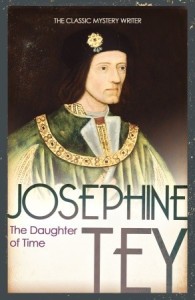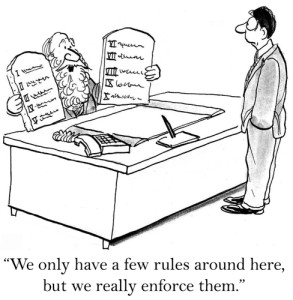By Kathryn Lilley, TKZ
Right now I’m reading AN EXPERT IN MURDER, a bang-up mystery written by Josephine Tey (a pseudonym for Scottish author Elizabeth MacIntosh, 1896-1952). Tey was a writer who delighted in breaking the formulaic mystery writing rules of her era. Those rules, as proclaimed by a group of London-based mystery writers, had been set forth in a manifesto called “The 10 Commandments of the Detection Club”. (Agatha Christie and Dorothy Sayers were founding members of the club.)
TEN COMMANDMENTS OF THE DETECTION CLUB
1. The criminal must be someone mentioned in the early part of the story, but must not be anyone whose thoughts the reader has been allowed to follow.
2. All supernatural or preternatural agencies are ruled out as a matter of course.
3. Not more than one secret room or passage is allowable.
4. No hitherto undiscovered poisons may be used, nor any appliance which will need a long scientific explanation at the end.
5. No (archaic ethnic term) must figure in the story. (Editor’s note: At the time, popular mysteries frequently included a character of Chinese descent. The writers used an archaic ethnic term that I don’t care to repeat here).
6. No accident must ever help the detective, nor must he ever have an unaccountable intuition which proves to be right.
7. The detective must not himself commit the crime.
8. The detective must not light on any clues which are not instantly produced for the inspection of the reader.
9. The stupid friend of the detective, the Watson, must not conceal any thoughts which pass through his mind; his intelligence must be slightly, but very slightly, below that of the average reader.
10. Twin brothers, and doubles generally, must not appear unless we have been duly prepared for them.
***
Josephine Tey gleefully broke most of these rules in her mysteries. Twin  imposters? Check. A sleuth playing a hunch? Check. In some of her books, Josephine Tey herself featured as a sleuth. (The Detective Club probably never dreamed of creating a rule against doing that).
imposters? Check. A sleuth playing a hunch? Check. In some of her books, Josephine Tey herself featured as a sleuth. (The Detective Club probably never dreamed of creating a rule against doing that).
Because she was a gifted, excellent writer, Tey got away with jettisoning the standard writing tropes of her era.
Nowadays, genre writers still like to talk about the “rules” of writing. (“Never open with a dream or the weather,” for example). Have you ever intentionally broken a writing rule in your work? Did your “infraction” succeed or fail? Or, have you ever read a story that broke the rules, but was successful nonetheless?


Not sure if I have successfully broken a writing rule, although weather might feature in my debut novel’s opening… but after the argument.
As for Detection Club rules, I suspect that I’m breaking a few at the moment… but I won’t give away which ones. My reasoning is that Agatha Christie broke at least one of them. Rule 1 perhaps?
I don’t know her stories well enough to say for sure, but I’d suspect that Christie and her cohorts pledged to avoid some of these “infractions” AFTER putting some of them on paper. Thanks for visiting, Roland!
Agatha Christie broke rule #1 in her story “The Murder of Roger Ackroyd”.
That’s the novel I was thinking of – and a favourite too as she handles it so well.
The latter half of the first rule makes no sense to me. “but must not be anyone whose thoughts the reader has been allowed to follow.” I’ve read several bestsellers that include the killer’s POV (most Patterson books, for instance). And my new thriller does just that. It’s not a classic detective story; it’s a classic cat-and-mouse thriller, but still. IMHO, it’s rules like this that get new writers, who don’t have a firm grasp of the crime genre, into trouble.
Not to mention Agatha Christie’s own Dr. Sheppard, the murderer who narrates The Murder of Roger Ackroyd. We get his every thought and feeling…though he is unreliable of course!
I think of Patterson as writing thrillers rather than classic mysteries. In a thriller, the main character is trying to prevent something terrible from happening. In a mystery, he’s trying to figure out who DID something terrible. In a thriller, I think it’s okay to get into the Bad Guy’s head, because we often already know who the Bad Guy is.
I’ve opened books with hurricanes, dreams and murderers’ narration. I’ve had the protag use his intuition. (cops admit they rely on it). And I’m working on a book with twins. So sue me! 🙂
I think using intuition is an important part of being human–That rule was made to be broken, IMHO. Thanks, Kris!
Actually, I think most of these rules are pretty sound, for any type of fiction.
#1 – We don’t want to wait to find out who the Lead is, do we?
#2 – Valid, unless the reader knows it’s a supernatural or horror off the bat.
#3 – If I were reading a tense mystery or thriller, I’d probably allow one “secret passage.” But more than that would have me going, “Come on!”
#4 – For pure mystery readers, guessing is part of the game, so this rule precludes “cheating” by the author.
#5 – This must have been a cliche in her day. There was a fascination with the East (e.g., Charlie Chan, Mr. Moto). So if the rule is don’t use stock characters that have been overused by others, I’d say it’s sound.
#6 – If a “hunch” is more than out of the blue, if it is a product of the sleuth putting things together in his mind then taking a slight leap of faith, I’m okay with it. But I think she’s referring to a great big hunch based on nothing that HELPS solve the mystery. I think even today’s readers wouldn’t like that.
#7 – We ignore this at our peril, but if done WELL (e.g., Gone Girl) one might be able to get away with it.
#8 – If a key clue is mentioned at the end, the reader will feel cheated big time by not having it mentioned earlier.
#9 – A “Watson” certainly shouldn’t be shaper than the sleuth. And not so “stupid” that the sleuth wouldn’t have him or her for a friend. Sound advice, I think.
#10 – Sound, because if the reveal happens at the end it will feel like the dreaded deus ex machina. It has to be set up early, as Gardner does in “The Case of the Perjured Parrot.”
So if one is going to write genre and choose to “break” one of these “rules,” then they’d better be very, very good, as Kathryn says Ms. Tey is.
Thanks Jim! Regarding Rule Number 2, I’m wondering how a paranormal or psychological story with an unreliable narrator would fit in terms of Rule 2–in which it’s not clear whether the paranormal/suspense aspects are “real,” or a product of the narrator’s mental state. I’m thinking about stories such as Shutter Island and The Sixth Sense. That’s actually the only type of paranormal story I enjoy reading–I have no interest in story worlds featuring garrulous grandma ghosties, witches, et al.
I have a WIP that starts with a dark and stormy night. The victim is killed by lightning. Hard to do without a storm, which means some time spent describing it. And the unusually storminess is a clue to the use of a magical device that influences the weather.
The listed rules prevent any sort of genre cross-over. Rule 2 means no mysteries in a fantasy setting. Rule 4 prevents mysteries in S/F settings. Rule 6 eliminates psychic detectives. Rule 5 means no international or ethnically varied cast. Tony Hillerman springs to mind as someone who broke the rules by setting his mysteries among the Navajo Nation. The genre would be a poorer place without his contribution.
Good points, KS! I would take number 5 as a general prohibition against cliche characters and devices, as Jim suggested. These rules, such as they are, were drafted by a bunch of golden age mystery writers, so I think they were limiting themselves specifically to that closed narrative world. As you point out, that would leave out a lot of fertile fiction territory!
I write thrillers, but I am trying to learn about mysteries. As it stands, rules or no rules, Brits or no Brits, I may not be quite as intelligent as my Watson because I’m just not able to get it.
Try as I might, I may never have a locked room or a dark and stormy night in my stories.
But how about a new, young detective, a widower who has found his new forever love, who finds out through a lady in his church when he Rapture will take place? He needs to find out if he can go later because he thinks he knows who killed Pastor Greely?
If that’s a comedy, it’s brilliant, Jim! I’m hearing “Get Me To The Rapture On Time” in my head. ?
Still good rules,Kathryn. Great artists like Picasso knew the rules before they broke them. The same is true of mysteries. Tey’s books have survived the test of time — and so have those rules, slightly updated by Jim.
Rule Number 5 is broken in the American t.v. show Elementary. It is a Sherlock Holmes show and Dr. Watson is played by Lucy Liu. Her parents are Chinese. immigrants.
AND Ms. Liu’s Watson is hardly the “stupid friend” with “…intelligence… slightly, but very slightly, below that of the average reader.”
🙂
That particular cliche is so aged that it probably doesn’t apply anymore–and you’re right that Liu is anything but unintelligent. Thanks, George!
Pingback: Writing Links in the 3s and 5…3/14/16 – Where Worlds Collide